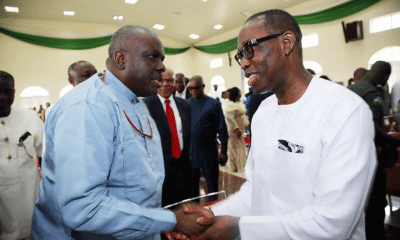National
Conviction: Ibori Drags British Government To European Court

James Ibori has dragged the British government to the European Court of Human Rights saying his conviction of fraud concerning Delta State government funds was obtained in violation of subsisting British law.
In the notice of appeal made at the European Court, the former governor of Delta State specifically affirmed that his conviction was achieved in contradiction of the law which prohibits use of intercepted communication in prosecuting charges against a suspect.
In his notice of appeal obtained by gwg.ng, Ibori submitted that section 17 of the Regulation of Investigatory Powers Act 2000 (‘RIPA’) prohibits any reference, in any proceedings, to an intercepted communication or its contents- e.g. an intercepted phone call – in circumstances in which its origin as an intercepted communication is disclosed or could be inferred.
The United Kingdom is virtually unique in having such a
provision: intercepted communications are used routinely as evidence in court
proceedings throughout Europe and the rest of the world.
Ibori in his statement of claim submitted that the
operation of s17 of RIPA, as applied in the highly unusual circumstances of his
case, resulted in a violation of his rights pursuant to Article 6 of ECHR.
According to the submission:
“The Applicant had
pleaded guilty to criminal offences but subsequently applied for permission to
appeal his convictions in light of the disclosure of new material. The Court of
Appeal held a hearing to determine that
application. During an adjournment of the hearing, Ms Sasha
WASS QC (‘SWQC’), who had previously been instructed to prosecute the
Applicant, sent a note to the Court of Appeal (‘the Wass Note’).
“It was a highly unusual because it provided information from
which it could be easily inferred that the source of the new material on which
the Applicant’s appeal was based was, in fact, intercepted communications. Such
a disclosure is prohibited in all court proceedings by s17 of RIPA.
4.3.”
In response to the Wass Note, and in an effort to attempt to
comply with s17 of RIPA for the remainder of the hearing, the Court of Appeal
imposed ‘Ground Rules’ on the parties. This limited what the Applicant’s
counsel could refer to in his submissions.
4.4. The Applicant submitted to the Court of Appeal – and
submits in this application – that s17 of RIPA, combined with the ‘Ground
Rules’, prevented him from properly developing his submissions before the Court
of Appeal. As a result his appeal hearing was unfair.
Ibori was jailed in London in April 2012 for 13 years for fraud estimated at about $78.5 million. Following differences with the Goodluck Jonathan government he had fled Nigeria for Dubai in 2010 from where he was extradited to Britain.
He returned to the country in January 2017 after serving out his sentence which considered time spent in jail during trial.
And For More Nigerian News Visit GWG.NG











